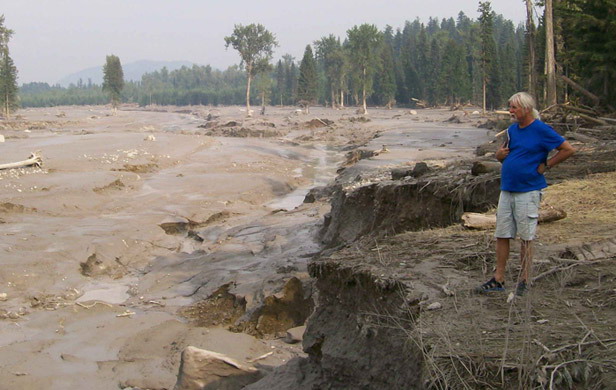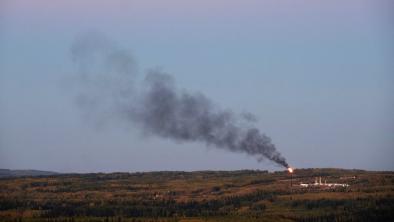Mount Polley Disaster: Can BC’s Government be Trusted?
Planet Save

Questions arising from the Mount Polley tailings pond breach:
- Is BC’s Liberal government in the pockets of industry?
- Can large corporations be trusted to place public safety ahead of profits?
- Does the Federal Government have any responsibility?
- Can B C’s government be trusted
“How come no one has to resign?” writes Rafe Mair. “This is a colossal screwup by the government of British Columbia. Is no one to blame? Whatever happened to the notion of ministerial responsibility?”
On August 4, the Mount Polley Mine tailings pond breached, discharging 4.5 million cubic metres of metals-laden fine sand into the surrounding lakes and rivers. Even as Interior Health lifted the “do not use water advisory” for communities north of where the Quesnel River narrows, questions of government incompetence are surfacing.
Though the government states water samples “meet provincial and federal drinking water guidelines for a third straight day,” the memo above is more cautious. Note the line: “However, the concentrations for Cadmium and Zinc could not be compared to guidelines, since the lab analysis detection limit was higher than the guideline and the detection limit for Chromium was at the guideline.”
“The tailings pond failure at Mount Polley Mine may be the worst industrial accident in B.C. I’ve seen in my lifetime and Premier Clark and the Liberal government need to be held accountable for their role in it,” said New Democrat (NDP) leader John Horgan.
“The Liberals need to release all records and reports on the development, monitoring, and enforcement of this tailings pond and dam within the week so the public can have confidence in the investigation and in the government’s ability to prevent such disasters and enforce responsible development in B.C.”
Horgan added that, “The impact on salmon could be tragic as well, as up to 10 per cent of the sockeye run on the Fraser spawn in the Quesnel Lake area.”
The Ministry of Environment memo states that “impact to aquatic life and fish is not expected,” but the Chiefs of the Xaxli’p, Sek’welwas andTsk’way’laxw First Nations report sickly fish, whose skin is peeling off, was found downriver at Six mile and Lytton.
Grand Chief Stewart Phillip, of the Union of BC Chiefs, and Green Party MLA Andrew Weaver have both called upon the province to order an emergency assessment of all tailings ponds.
Phillip told the Globe and Mail that this spill could have an enormous impact on future relationships between First Nations and the mining industry.
“It’s an issue of toxic chemicals – oil, mining sludge – versus water, the environment,” he said.
“A spill is a spill,” Phillip added, comparing the impact of this disaster to possible spills by the proposed Enbridge or Kinder Morgan pipeline projects. .
The NDP leader visited Likely on August 6.
Premier Christy Clark arrived a day later, to tell Likely residents, “Our hearts are with you.”
Though Bill Bennett, Minister of Mines denies that cuts to to government staff and the number of inspections played a part, they began the year the Liberals took office. By 2008, half as many inspections were being carried out as had been under the NDP.
The former engineer of the tailings facility warned the Ministry of Mines about Mount Polley when his firm resigned in 2011. The phrase “Knight Piesold will no longer have any responsibility” is repeated twice in his letter, then:
“The embankments and the overall tailings impoundment are getting large and it is extremely important that they be monitored, constructed and operated to prevent problems in the future. Knight Piesold would be happy to assist the formal handover to the Engineer of record. As we have a long relationship with the Mines Branch and the Ministry of Energy, Mines and Petroleum Resources, we consider it prudent to notfy them of the change in status.”
The Ministry of the Environment gave Mount Polley Mining Corp warnings about excessive amounts of water in the tailings pond on five separate occasions:
- Aug. 30, 2012 – “… failure to report exceedance of the height of effluent for the perimeter pond”
- January and April 2012 – “… not submitting monitoring data for one of the groundwater monitoring wells”
- April 18, 2014 – “… bypass of authorized treatment works. The site experienced high flows due to spring freshet which caused the pump system to become blocked and resulted in an overflow of effluent to the long ditch.”
- May 24, 2014 – “… exceedance of the height of effluent within the tailings impoundment. The effluent level returned to authorized levels commencing June 30, 2014.”
“We are very concerned about the lack of monitoring and enforcement by the provincial government prior to this disaster,” said Sierra Club BC’s Forest and Climate Campaigner, Jens Wieting. “Relying on industry to monitor their own behaviour is pure folly. Now we are facing possible contamination of drinking water, of salmon populations and the whole web of life in the Cariboo region.”
Some may ask if the Canadian government should also be shouldering blame. The old Navigable Waters Act of 1882 stated that no one could block, alter or destroy any water deep enough to float a canoe without federal approval. It’s one of the pieces of legislation Stephen Harper jettisoned when he limited federally protected waters to a select list of three oceans, 97 lakes and 62 rivers in 2012. Provincial and municipal governments were expected to pick up everything else.
Gwen Barlee, of the Wilderness Committee, compared the breach to a similar catastrophe that took place in Tennessee during 2008. They only managed to clean-up 3% of the spill and the cost was enormous.
“The estimates of Tennessee were approximately 600 million and 800 million dollars,” she told Global News. “That’s huge and is it going to be the public that’s left on the hook for the cleanup costs? Does Imperial Mines have enough money? Have they put enough bonds down to be able to cover the costs of an appropriate cleanup?”
If that is the case, why is Imperial Metals Corp., which owns the Mount Polley mine, getting away with a mere $1 million fine? ($100 million seems more appropriate.)
Some question whether it is because Alberta billionaire Murray Edwards, the controlling shareholder of Imperial Metals Corp, is a key supporter of BC’s Liberal Government. Six of the companies in which he is a major investor contributed $482,857 to the Liberal political campaigns. Edwards also helped organize a $1 million fundraiser in Calgary when Clark made her reelection bid last year.
The next Provincial election is not likely to occur before 2016. In the meantime, the Liberal government needs to clean this mess up. Hopefully, that will include legislation that can protect the environment.
“We are focused on mitigating immediate effects and understanding the cause of the breach,” Imperial Mines said in a press release Thursday Aug 7. “Our priorities continue to be human and environmental safety. Debris in Quesnel Lake is being cleared and contained. The log boom boats and crews we commissioned have secured the timber that was swept into the lake and are now gathering lighter debris.”
An Aug 10 update from the provincial newsroom added that, “As of this morning, Imperial Metals has now begun pumping water from Polley Lake into Hazeltine Creek and down to Quesnel Lake.
By controlling this release of water as soon as possible, it will significantly lower the potential risk of another breach.”
The article orignally appeared in the EcoReport.


